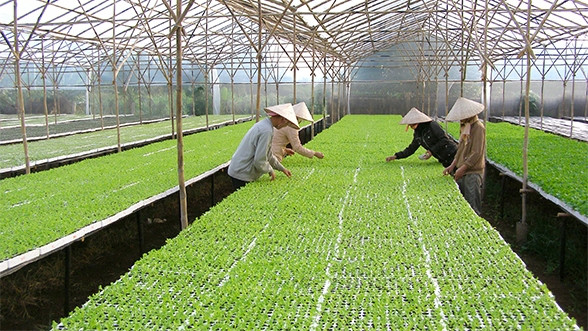Currently, nearly 50 provinces and 100 enterprises are implementing organic agricultural production models with the participation of more than 17,000 farmers. Organic agricultural products include mainly rice, shrimp, coconut, coffee, cocoa, milk, tea, vegetables, fruits, cinnamon, anise, essential oils and others.
Besides domestic consumption, organic agricultural products are also being exported to 180 countries around the world, including major consumer markets such as the US, China, Japan, Germany, the UK, the Republic of Korea (ROK), Russia, Singapore, France, Belgium, the Netherlands, Italy and others with a total export turnover of about US$335 million per year.
Organic agricultural products not only bring about a high level of economic efficiency, but also are good for human health and the environment, so over the past few years, many enterprises, cooperatives and farmers have implemented the production model of organic agricultural products.
However, the investment process to convert from conventional to organic production is very expensive; especially as the organic production system does not use synthetic chemicals and only uses materials meeting organic production standards.
In addition, many manufacturers and managers still lack knowledge about organic agriculture while most farming households are conducting small-scale and fragmented production, making it difficult to gather together areas for organic production. Meanwhile, management agencies lack coordination in building standards, production regulations, and the issuance of certification of labels and quality of organic products.
As an agricultural country with a lot of potential and advantages regarding organic agriculture, but to become a country with a high level of organic production equal to that of advanced countries, the Ministry of Agriculture and Rural Development needs to clearly define the potential and forecast the development trend of organic farming in both the world and in Vietnam. Thus, the ministry can determine the main production areas and the main products and the key markets for organic agricultural products.
At the same time, the agricultural sector should coordinate with other sectors in building and controlling the quality and labels of organic products before bringing them to the market.
Besides maintaining arable land, localities need to continue boosting intensive farming and increasing productivity to ensure food security. They should base this on land area as well as key agricultural products to build plans for organic agricultural development.
Localities also need to proactively organise scientific research and human resource training on organic production in accordance with TCVN 11041: 2017, the National Standard on organic agriculture. It is also necessary to raise the community's awareness of organic agriculture, as well as fostering trade promotion, brand building and market development of organic agricultural products.
In the short term, the Ministry of Agriculture and Rural Development needs to coordinate with localities, sectors, producers and businesses to thoroughly grasp the development perspectives, objectives, tasks and solutions of the Organic agricultural development project in the 2020 – 2030 period which has just been approved by the Government.
Thereby, they can develop a plan to implement the project in the most effective way, in line with the restructuring of the agricultural sector towards sustainable development, contributing to enhancing the brand of Vietnamese agricultural products in the international market.
















